
Woodrow Wilson Guthrie was an American singer-songwriter and composer who was one of the most significant figures in American folk music. His work focused on themes of American socialism and anti-fascism. He inspired several generations both politically and musically with songs such as "This Land Is Your Land".

Earl Eugene Scruggs was an American musician noted for popularizing a three-finger banjo picking style, now called "Scruggs style", which is a defining characteristic of bluegrass music. His three-finger style of playing was radically different from the traditional way the five-string banjo had previously been played. This new style of playing became popular and elevated the banjo from its previous role as a background rhythm instrument to featured solo status. He popularized the instrument across several genres of music.

"This Land Is Your Land" is a song by American folk singer Woody Guthrie. One of the United States' most famous folk songs, its lyrics were written in 1940 in critical response to Irving Berlin's "God Bless America". Its melody is based on a Carter Family tune called "When the World's on Fire". When Guthrie was tired of hearing Kate Smith sing "God Bless America" on the radio in the late 1930s, he sarcastically called his song "God Blessed America for Me" before renaming it "This Land Is Your Land".
"Pastures of Plenty" is a 1941 composition by Woody Guthrie. Describing the travails and dignity of migrant workers in North America, it is evocative of the world described in John Steinbeck's The Grapes of Wrath. The tune is based on the ballad "Pretty Polly", a traditional English-language folk song from the British Isles that was also well known in the Appalachian region of North America.
"Honey, Just Allow Me One More Chance" is a song recorded by blues musician Henry "Ragtime Texas" Thomas in 1927, under the title "Honey, Won't You Allow Me One More Chance". It was covered by Bob Dylan on his album The Freewheelin' Bob Dylan, which came out on May 27, 1963.
"Worried Man Blues" is a folk song in the roots music repertoire. It is catalogued as Roud Folk Song Index No. 4753. Like many folk songs passed by oral tradition, the lyrics vary from version to version, but generally all contain the chorus "It takes a worried man to sing a worried song/It takes a worried man to sing a worried song/I'm worried now, but I won't be worried long." The verses tell the story of a man imprisoned for unknown reasons "I went across the river, and I lay down to sleep/When I woke up, had shackles on my feet", who pines for his lost love, who is "on the train and gone."

Will the Circle Be Unbroken: Volume Two is the nineteenth studio album by American country folk group Nitty Gritty Dirt Band, released on May 1, 1989. The album follows the same concept as the band's 1972 album, Will the Circle Be Unbroken, which featured guest performances from many notable country music stars.

Carter Family picking, also known as the thumb brush, the Carter lick, the church lick, or the Carter scratch, is a style of fingerstyle guitar named after Maybelle Carter of the Carter Family. It is a distinctive style of rhythm guitar in which the melody is played on the bass strings, usually low E, A, and D while rhythm strumming continues above, on the treble strings, G, B, and high E. This often occurs during the break. The style bears similarity to the frailing style of banjo playing and is the rhythm Bill Monroe adapted for bluegrass music two decades later.
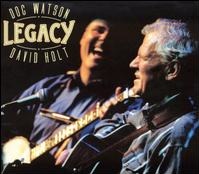
Legacy is the title of a recording by American folk music and country blues artist Doc Watson and David Holt, released in 2002.
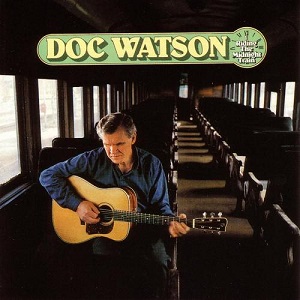
Riding the Midnight Train is the title of a recording by American folk music artists Doc Watson and Merle Watson, released in 1986. It is the last album Merle Watson recorded before he was killed in a tractor accident.
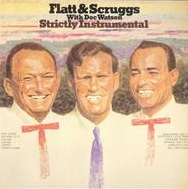
Strictly Instrumental is the title of a recording by American folk music artists Doc Watson, Lester Flatt and Earl Scruggs, released in 1967.
"I Still Miss Someone" is a song co-written by Johnny Cash and his nephew Roy Cash, Jr. and originally recorded by American country music singer Johnny Cash. He first recorded it in 1958 as the B-side to "Don't Take Your Guns to Town".

A World of Our Own is the fourth studio album by the Australian group The Seekers. The album was released in 1965. In some countries, the album was titled The Seekers. The album peaked at number 123 in the Billboard 200 and number 5 in the United Kingdom.
Louise Scruggs was an American music manager and booking agent. Scruggs became the first woman manager in the music industry when she started managing American bluegrass band Flatt and Scruggs in 1955. She was posthumously awarded the Joe Talbot Award in 2006 and inducted into the International Bluegrass Music Hall of Fame in 2010.

The Fabulous Sound of Lester Flatt & Earl Scruggs is a studio album by bluegrass artists Flatt and Scruggs. It was released in 1964 by Columbia Records.
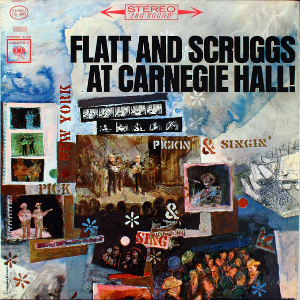
Flatt and Scruggs at Carnegie Hall! is a live album by bluegrass artists Flatt and Scruggs. It was recorded on December 8, 1962, at the first bluegrass concert ever performed at Carnegie Hall. It was released in 1963 by Columbia Records.

Recorded Live at Vanderbilt University is a live album by bluegrass artists Flatt and Scruggs. It was released in 1964 by Columbia Records.
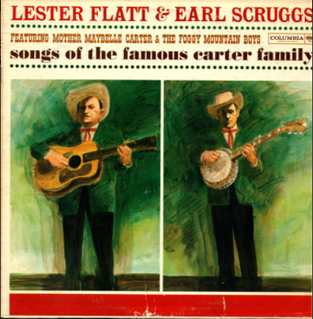
Songs of the Famous Carter Family is a studio album by bluegrass artists Flatt and Scruggs featuring Mother Maybelle Carter and the Foggy Mountain Boys. It was released in 1961 by Columbia Records, catalog numbers CL 1664 (mono) and CS 8464 (stereo).
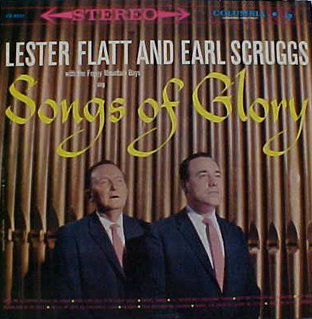
Songs of Glory is a studio album by bluegrass artists Flatt and Scruggs with the Foggy Mountain Boys. It was released in 1960 by Columbia Records, catalog numbers CL 1424 (mono) and CS 8221 (stereo).













